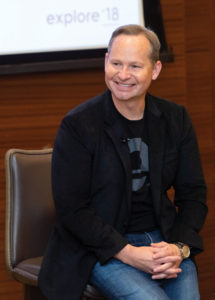LAS VEGAS—Artificial intelligence (AI) is the next big game changer in travel, according to Mark Okerstrom, CEO/president of Expedia Group, speaking at Explore ’18, the company’s partner conference held here in December at Aria Resort & Casino.
Last year, the company said that the use of voice assistants, like Amazon’s Alexa, was the next big thing for the industry. “But increasingly, we are understanding that voice is actually a subset of a larger theme,” said Okerstrom. “The theme is artificial intelligence. This isn’t about robots and crazy wild things. All this means is that we now have the computing capability—not just us, but the world—to process vast amounts of data in real time and write software to be able to construct our code base, our applications, whether it is a website or mobile app, to do different things based upon the data that we see. One of the applications of that is taking voice, translating that into data that we can ultimately understand and then programming our applications to respond.”
AI is a game changer when it comes to processing data. “We used to take huge data sets and run algorithms to tell us what we should do next,” he said. “A good example of this is a whole bunch of bids on Google to acquire traffic to come to our websites. We then see what happens and how much people buy. Then, we upload all of this data, we crunch all of these numbers and it would take—in many cases—days to run these queries. We are talking about billions of data points that had to be uploaded. We are doing that in hours. From hours, we are going to go to minutes. From minutes, we are going to go to seconds.”
The company is already making use of AI with some of its brands, including home-sharing site VRBO. “What you will find if you are in one of the test markets is that you can interact if you have a question around a particular property,” he said. “‘Does it have a pool? How far is it away from the beach?’ You can actually speak into your phone or you can text, and we are creating algorithms to answer those texts because we actually know in our database whether it has a pool. We are training these algorithms to respond to those questions and then we are actually putting those answers onto the detailed page; this is all happening in a detailed way.”
Okerstrom said that the company has a great deal of traveler interactions to gather its data for the algorithms. “The great thing about Expedia Group is that we have years and years of voice recordings from our call centers to actually train algorithms around when someone says ‘change’ or ‘New York,’ what does that mean, and how can we train our algorithms to understand what that means and then try to respond,” he said.
He thinks it is very possible that in five or 10 years, the company will be able to provide its partners a conversation service that they can integrate into their applications to handle consumer requests or questions in an automated way. “When we talk about the future, we talk about the platform model, the platform mindset, the fact that we want to power and enable our partners to be successful and to reduce their costs,” he said.
It will also make personalization of the digital experience for each customer a reality. “Personalization, historically, has been a dream,” said Okerstrom. “I think a subset of that is what happened with voice and chat, and a subset of that is what happened with personalization. We are actually doing it now with our partners—again, this platform concept, where we are looking at real-time activity and using AI to make recommendations to our hotel partners around things they might be able to change, whether it is content, photos, rates or inventory types, to help make suggestions to help them be more successful on our platform. This data is getting more and more like real time.”
When asked by Hotel Business about the recent data breach experienced by Marriott, which occurred shortly before the conference, Okerstrom said that AI plays a part in Expedia Group’s cybersecurity efforts. “The fact is that I think this is a wake-up call for everyone,” he said. “We have to take this stuff seriously. Cyberattacks are very sophisticated. They are being carried out by nation-states. They are being carried out by people who see pots of money to go after.”
He continued, “We have, for a number of years, taken this as a top priority. We have a security operations center, which is monitoring activity around all of our networks all the time. We have AI engines that are sitting on top and looking for irregular network activity and, in many cases, taking automated action to then make sure that we are addressing anything that we see. At the security operations center, we are alerting humans to look into things when we see things that are off… It is very difficult to defend against everything, but it is very much a game of man against machine. We’ve got our smartest machines on it, and also some of our smartest men and women.”
Okerstrom said that despite all of the protections any company can add to its systems, humans are the weak link. “The problem with technology…is that humans are still involved in this,” he said. “It just takes one email to you that looks like it came from your boss saying, ‘We are doing a reset, please enter your username and password.’ Now someone has got you, and whatever access you have, they have. That is the weakness in the link. We have technology that says we know where [a specific person]logs in, we know how frequently he logs in, we see something irregular, he has never tried to access this before—these are all algorithms that are running, but the weak link is you.” HB


